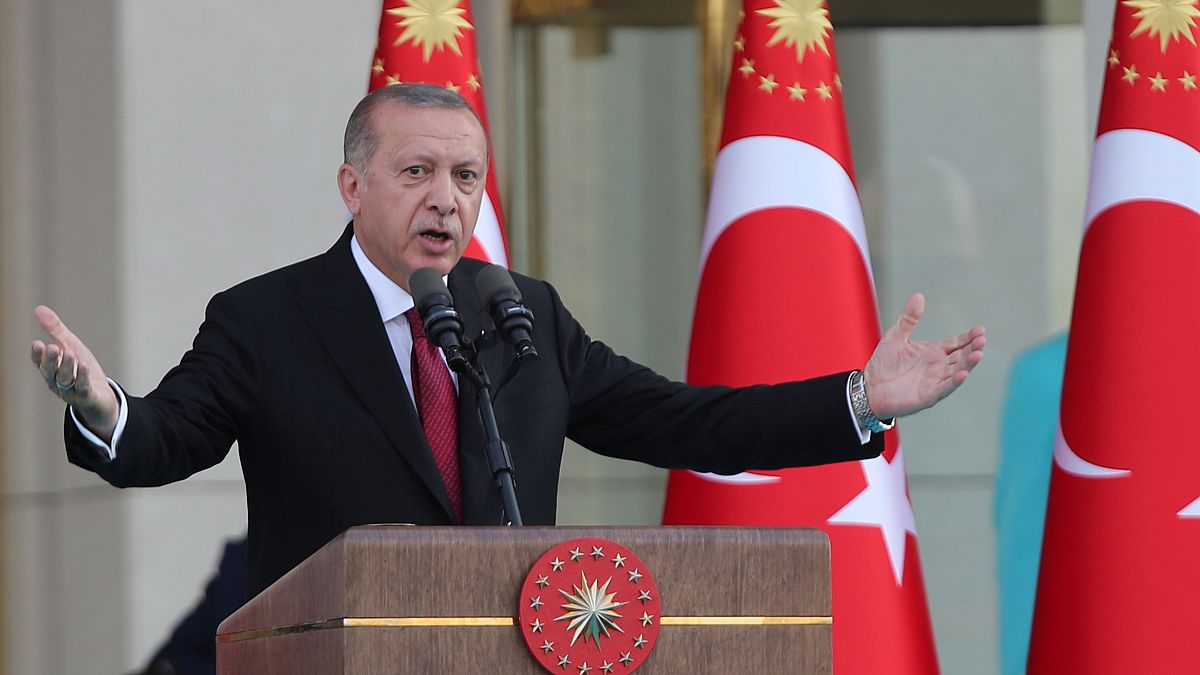Turkish President Recep Tayyip Erdogan has acted swiftly to put his new sweeping powers into practice, following his inauguration on Monday.
Turkey’s Recep Tayyip Erdogan has named his son-in-law as finance minister amid signs that the president is intent on concentrating power in his own hands following his election victory last month.
On Monday Erdogan was sworn in with sweeping new executive powers in what has been labelled a “hyper-presidency”.
The inauguration formalised a transition to a new system that he says will deliver a “strong government and a strong Turkey”. However, as the purge against perceived opponents of Erdogan continues, critics say Turkey is now no longer a democracy but an autocracy.
What has Erdogan done since starting hs new term?
Hours after being sworn in, President Erdogan appointed his son-in-law Berat Albayrak as finance minister, a post whose remit is extended to cover the treasury. The former energy minister, who entered parliament in 2015, now takes on what used to be two powerful economic roles.
In a surprise move, former deputy prime minister Mehmet Simsek has been ousted from the cabinet. He was seen as market-friendly and the last member of Erdogan’s team who had a good relationship with Turkey’s traditional investors. Nor is there any room in the cabinet for the outgoing finance minister Naci Agbal.
Before his re-election, the president had vowed to take more direct control of monetary policy. Immediately he published a decree to curb the powers of the central bank governor, a post he is expected to appoint in future.
The head of the army, Hulusi Akar, has been named defence minister – an unprecedented development. Erdogan now controls the army and intelligence service.
He can also choose judges and issue decrees. The role of prime minister has been abolished, while the new 16-member cabinet contains only four members of the last government, and only four of the new team are elected.
How are these decisions being interpreted?
Recep Tayyip Erdogan says the new system – which narrowly secured backing in a referendum in 2017 – marks a “new start” for Turkey. “We are leaving behind the system that has in the past cost our country a heavy price in political and economic chaos,” he said at his inauguration.
However, his power grab over monetary policy caused alarm in the markets. The lira dropped nearly three percent against the dollar on Monday, and has lost almost a fifth of its value this year.
Critics say the new system lacks accountability and puts far too much power in the hands of an increasingly autocratic figure with no checks and balances.
The opposition Cumhuriyet newspaper said “a partisan one-man regime starts officially today”. However, although Turkey is polarised over the president’s new powers, there has been little criticism in the media that have increasingly fallen into line with Erdogan or been brought under state control.
How is Erdogan treating his opponents now?
Since the June election, there has been no sign of a let-up in the crackdown against dissent. Another 18,000 state employees were dismissed at the weekend over alleged terrorist links.
A former opposition MP, Eren Erdem, has been arrested on terrorism charges – while prominent academic Nuriye Gulmen, who went on hunger strike after being sacked, was detained again. Dozens more people have been detained on suspicion of links to the Gulen movement, inspired by the exiled cleric Fethullah Gulen who Erdogan believes was behind the 2016 failed military coup. More media outlets have been closed.
Since last year, Turkey’s huge clampdown on dissent has purged well over 100,000 public servants, while media outlets, non-governmental organisations, cultural centres and private schools have been closed. More than 160 journalists and media workers – branded criminal terrorists by Erdogan – reportedly remain behind bars.
What about relations with Europe?
European leaders and organisations have regularly clashed with Turkey over its involvement in the war in Syria, human rights and other issues.
The president’s inauguration provided a telling indicator of Turkey’s differences with the West and the EU. There was a notable absence of Western leaders among the 50 high-ranking guests, which included 22 heads of state.
Those who did attend included Bulgaria’s president, Hungarian Prime Minister Victor Orban and Russian Prime Minister Dmitry Medvedev. Germany sent former Chancellor Gerhard Schroder, in line with protocol according to the foreign ministry.
Ankara’s allies in Africa and the Middle East were present – as was Venezuelan President Nicolas Maduro who hailed Erdogan as the “leader of a new multi-polar world”.
Although Turkey’s deal with the EU over migrants remains in place, its bid to join the bloc is all but dead and significantly, its EU ministry is now being swallowed up by the foreign ministry.
Some commentators expect the country to become even more nationalist in its foreign policy, with Erdogan becoming even more assertive in his denunciations of western European leaders and values.
